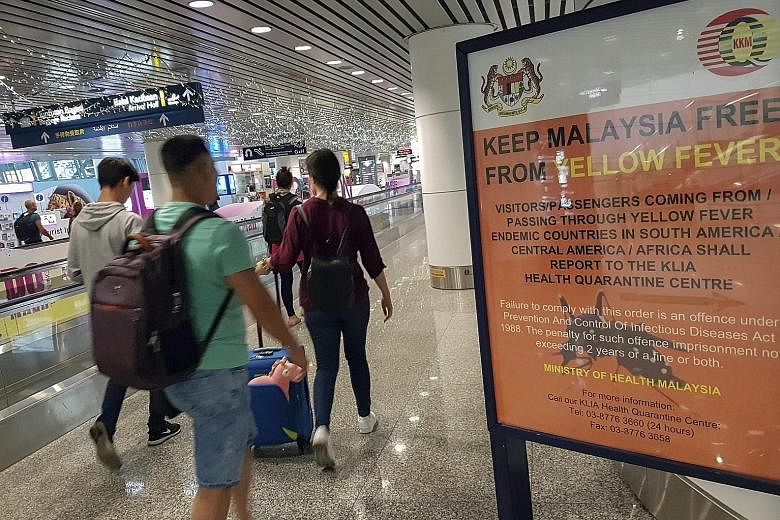Malaysia has stepped up precautionary measures following Singapore's first locally transmitted case of the Zika virus.
"There's a high risk of the virus entering our country and we have to accept these risks," Health Minister Subramaniam Sathasivam told reporters yesterday.
Malaysia has set up thermal scanners - which can detect fever - at its airports and the two major entry points in Johor, where an estimated 150,000 to 200,000 people move daily across the border with Singapore.
Only those travelling by bus between Johor and Singapore would have to walk past the scanners. Those travelling by car, train or motorcycle would be given pamphlets on the Zika virus.
"There is no simple way of screening all of them," said Datuk Seri Dr Subramaniam. "Asymptomatic patients are a bigger problem because they do not know they have it in their body and they can cause it to spread to other people. It is a risk."
He urged those returning from countries with reported cases of Zika infection to have themselves tested voluntarily at major hospitals.
Twelve government hospitals and four public health laboratories are available nationwide to conduct such tests, which are free for citizens. It takes from six hours to a day for the results to be known. Residents of Johor can head to Hospital Sultanah Aminah or the state's public health lab in Johor Baru.
Malaysia's Health Ministry has also advised the public to adopt the same measures to combat the Aedes mosquito, which not only spreads Zika but dengue and chikungunya as well. The measures include the use of mosquito repellent, keeping homes clean and eliminating stagnant water.
"If we address the issue of Aedes, we are sorting this issue of Zika as well," said Malaysia's national adviser on infectious diseases, Dr Christopher Lee.
The Health Ministry has conducted 784 blood tests for the Zika virus since July last year, with none confirmed thus far. Athletes who returned from the recently concluded Olympic Games in Brazil, a country hit hard by Zika, were tested and all the results were negative.
The ministry has also boosted efforts to combat the mosquito menace with increased fogging in all states, especially Johor.
"We'll continue this for a period of time until Singapore's situation calms down, with no new cases," said Dr Subramaniam.
Singapore has confirmed 56 cases of locally transmitted Zika, mostly involving workers from a construction site.
Dr Subramaniam, in spite of the concerns over Zika, noted that dengue remains the larger health issue for Malaysia.
"Dengue is still a bigger problem than Zika for us because dengue can cause death," he said.
Malaysia has seen a rise in dengue cases in the last two weeks of August, with a weekly average of 1,900 to 2,000 cases. Both Singapore and Malaysia are in the grip of a dengue outbreak with a record number of cases.


